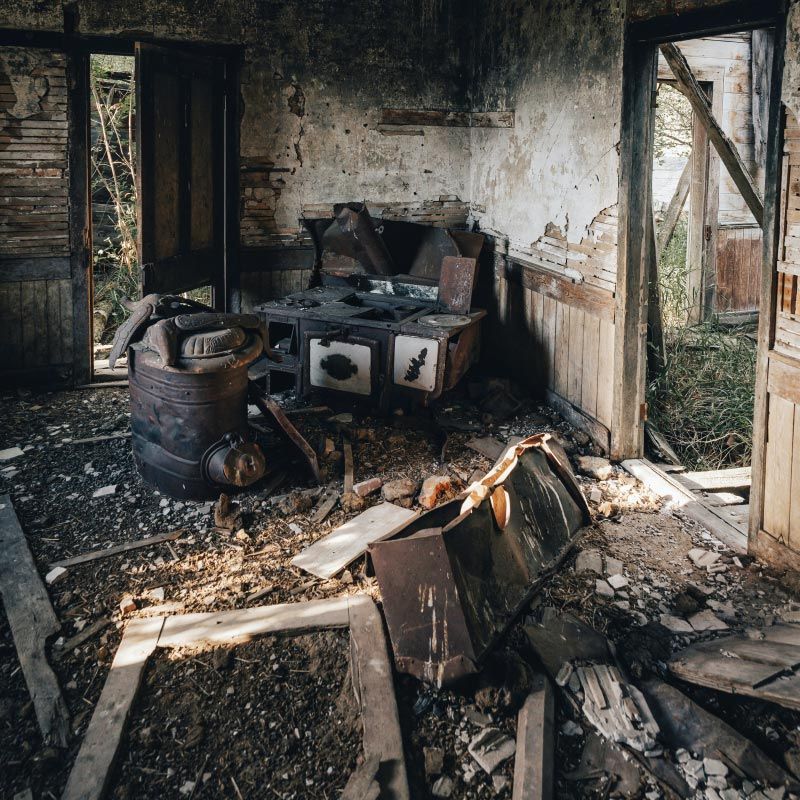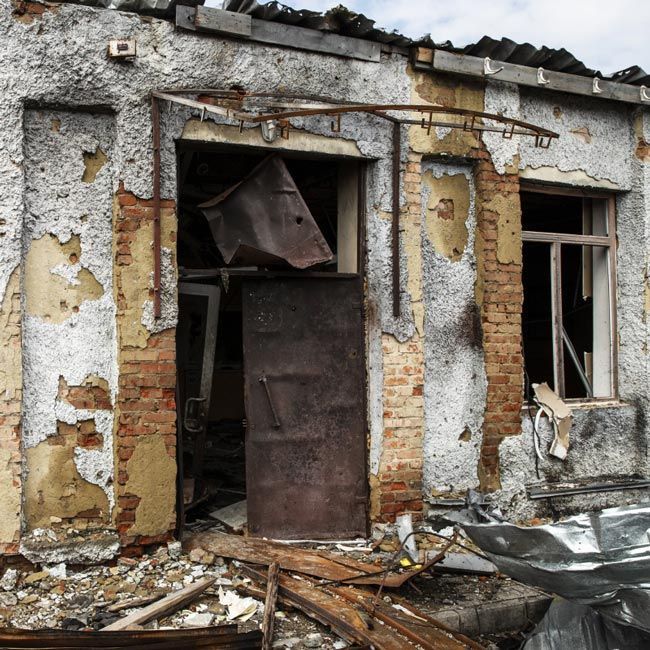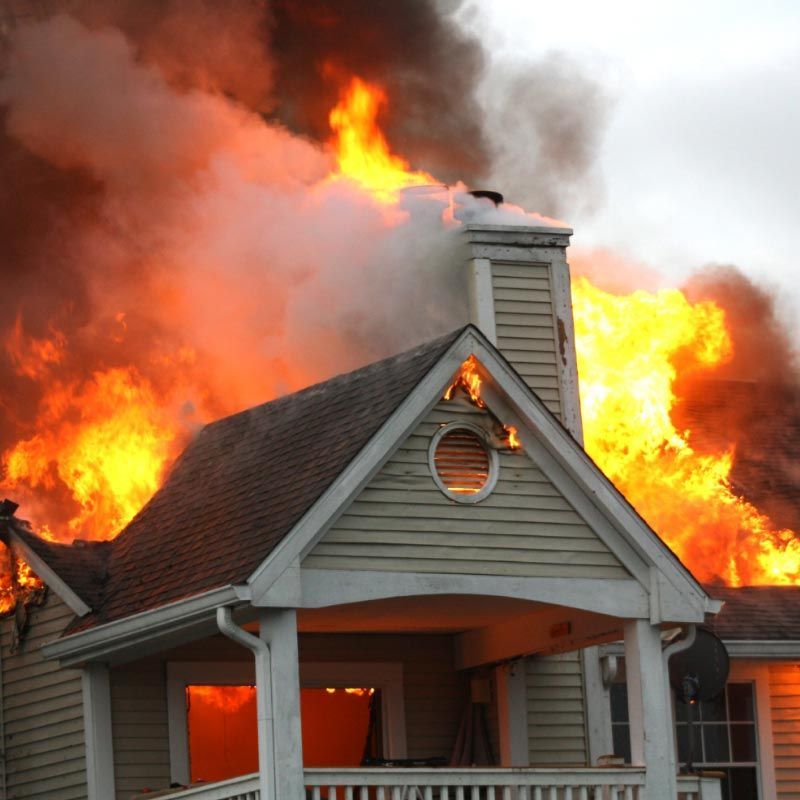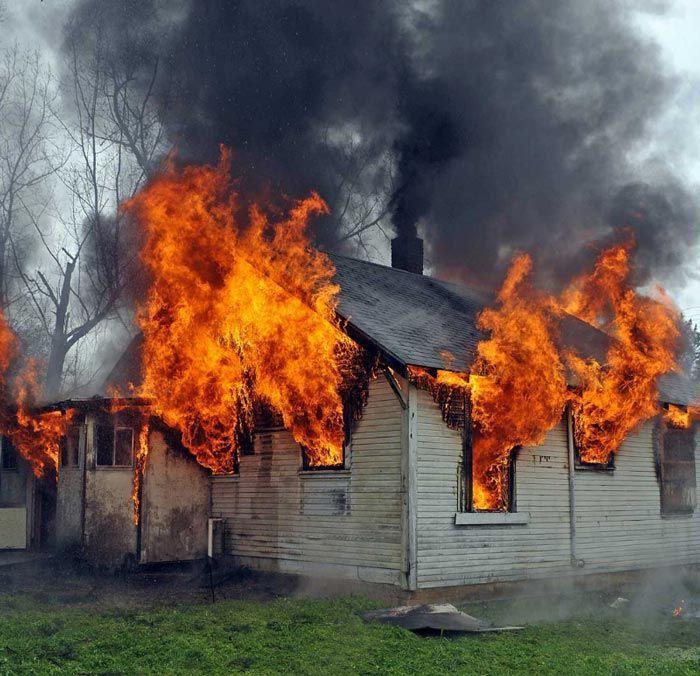House Fires Statistics [Causes, Fatalities, and More]
Free Offer Form
We will get back to you as soon as possible.
Please try again later.
House fires are traumatic events that cause thousands of civilian deaths. In fact, 358,300 house fires in the U.S. occur annually.
Roughly 1 in 413 houses nationwide experience house fires, and home fire deaths may rise from an average of 2,840.
However, most home fires are preventable with fire safety knowledge.
Below is a compilation of house fire statistics to give insight into house fire frequency, their major causes, and life-saving strategies.
Breaking Down House Fire Statistics in the United States
In 1980, 734,000 house fires occurred. Though the number of house fires began to significantly reduce by nearly half over the years, property damage increased.
Let's cover the frequency of home fires.
Frequency and Annual Rate of House Fires
Home fires are very common. The National Fire Protection Association (NFPA) provides the following data points:
- 358,300 home structure fires in the U.S. occur yearly.
- 86,000 occur in apartment buildings.
- Home structure fires are reported every 93 seconds.
- A fire department responds to reported home fires every 23 seconds.
- Cold months experience a peak in reported home fires.
Even with a decrease of roughly two-thirds in home fire death rates, the number of fatalities that fire departments responded to annually remains concerning.
Consequences of House Fires: Fatalities and Injuries
These are house fire casualties in numbers:
- Home fire deaths are reported every 2 hours and 18 minutes.
- Home fire injuries occur every 36 minutes.
- For every 1,000 reported fires, 7.9 deaths happen.
- Civilian fire deaths increased to an estimated average of 79% for home fires.
- Home fire injuries averaged 73%.
- Older civilians have higher death rates. Out of the 79% estimated average, 65% of civilian deaths were 65 and older.
- In 2022, there were 3,790 civilian fire deaths and 96 on-duty firefighter deaths.
- From January to February 2024, 317 home fire fatalities were reported.
Home fire deaths may rise if people remain unaware of fire prevention measures.
Examining Fatal Residential Building Fires
The following are details surrounding residential building fires:
- One- and two-family homes experience the most home fire deaths.
- Civilian death rate: 59.1%
- Civilian injuries: 54.3%
- Most reported home structure fires occur from 5:00 PM to 8:00 PM.
- In 2021, 45% of fatal home fires happened during the early morning. 41% of victims were asleep.
- In 80% of fatal home fires, the fire damage spread beyond the original heat source.
- These areas experience the most fire damage:
- Kitchen: 44%
- Outside the home: 38%
- Other areas: 38%
- Bedroom: 6%
- Chimney or flue: 4%
- Living rooms: 3%
Though not all house fires cause deaths, home fire injuries are most common in residential areas.
Impact of Residential Building Fires on Injuries
Cooking equipment and issues with electrical outlets are some of the leading causes of house fires, and fire departments find that they often cause injuries.
These are the facts:
- Of 74% of home fire injuries, 1,400 were from electrical fires.
- Nearly three-quarters of reported fires result in injuries from cooking fires.
- 79% of house fire injuries involved smoke inhalation and thermal burns.
- In 2017-2019, 33% of home fires happened in bedrooms.
Poor electrical distribution and negligence regarding heat sources may escalate civilian deaths.
Economic Consequences of House Fires
Direct property damage from house fires impacts the economy annually.
- In 2016, house fires caused $8.64 billion in property loss.
- From 2023 to 2024, the estimated average number increased to $9 billion in property loss.
A fire's effect on house prices can be major, especially since fire-damaged properties lose value.
Assessing the Monetary Loss from Residential Fires
In 2019, claims for fire and lighting equipment damage reached $79,785.
Temporary housing and medical costs add to expenses. Fire-damaged properties lose value —and
not everyone has homeowner's insurance to cover damages
Exploring Common Causes of House Fires
According to the NFPA, smoking materials are the leading cause of home fires. Common smoking materials include kitchen equipment or electrical appliances.
These are the frequent causes of house fires divided by cause:
- Cooking: 49%
- Heating: 13%
- Electrical: 9%
- Intentional Fire Setting: 9%
- Other: 6%
- Smoking: 5%
- Clothes washer/dryer: 4%
- Exposure to another fire: 3%
- Candle Fires: 2%
As the third leading cause of why home fires occur, electrical issues in lighting equipment are particularly dangerous.
Fires Triggered by Appliances and Electrical Issues
Two common sources are faulty appliances and electrical distribution errors. These are statistics on home fires caused by electrical issues:
- Annual deaths: 390
- Annual number of injuries: 1,400
- Annual cost in property loss: $1.3 billion
These are why electrical fires start:
- Faulty wiring
- Overloaded circuits
- Malfunctioning appliances
Not unplugging electrical equipment may also start a fire.
Incidents of Cooking-Related Fires
Cooking is the leading cause of home fires.
- 44% of reported home fires start from a kitchen.
- 88% of cooking fire deaths are from oven ranges or cooktop fires.
- 529 deaths are from cooking-related fires.
As a landlord, a tenant's accidental house fire from cooking may lead to additional expenses.
Fires Instigated by Exposure to Flammable Materials
Many household items, like dish towels and nail polish, can become some of the most common causes of house fires if exposed to heat.
In 2023, clothes catching fire from heat sources led to 7% of home fire deaths.
The NFPA found that flammable materials cause the following statistics:
- 51,000 home fires
- 168 deaths
- 1,029 injuries
- $644 million in property damage
Careless smoking near these items is also a leading cause.
Frequency of Heating-Related Fires
Heating equipment is the second leading cause of home fires.
- From 2016 to 2020, heating equipment caused 13% of the 44,210 reported home fires.
- Space heaters cause more than two in five fires.
- Chimney fires, fireplaces, and heat systems are common causes.
Forgetting to clean chimneys is the second leading cause of fires due to dust or ash buildup.
Incidences of Intentional Fires
Intentional fires are purposefully started for different reasons:
- Deliberate misuse of a heat source
- Fire from an incendiary nature (arson)
- Controlled burn fires (crop clearing)
In 2021, 18,200 intentional fires happened, causing 275 deaths and 700 injuries.
According to the U.S. Fire Administration, intentional fires changed from 2012 to 2021:
- 1% increase in intentional fires
- 21% decrease in deaths
- 1% increase in injuries
- 32% increase in dollar loss
As the fourth leading cause of home fires, intentional fires are dangerous, especially in areas without fire departments.
Risks of Fires Caused by Smoking
In 2021, the U.S. Fire Administration reported 7,800 fires caused by smoking materials, with $361.5 million in property loss.
Leaving smoking materials unattended near flammable items leads to more damage.
However,
will insurance cover a house fire started by a cigarette? Yes, most insurance policies cover such damage. However, intentional fires from smoking materials are
not covered.
Can I Sell a Fire Damaged House National?
Yes. You can sell a fire-damaged house. However, it may be harder to sell in the local National real estate market in as-is condition. You would have to make repairs and possibly rebuild most parts of your house before a buyer takes interest in the property. Your best option when selling a fire-damaged house is a cash buyer. They buy burned houses as-is so you don't need to spend money on repairs. They'll handle all the cleanups and renovations for you, however, expect that their offer may be below the cash value of your property.
Seasonal Variations in House Fires
The number of house fires changes with the weather.
From 2016 to 2020, 46% of home fires occurred from December to February due to increased electrical use.
According to National Park Service data, 85% of annual wildfires occur during summer. 2018 had more than 50,000 reported wildfires.
Analyzing Holiday and Seasonal Fire Data
These are the details on seasonal fires:
- From 2011 to 2015, Christmas tree fires caused 13 civilian injuries.
- From 2016 to 2020, Christmas tree injuries lessened to 11. However, U.S. fire departments responded to 160 home structure fires caused by Christmas trees.
- 25% of Christmas tree fires happen from faulty wiring or overloaded outlets.
Leaving them on for
several days is a leading cause of sudden fires.
Measures for Preventing House Fires
Anyone who's lost family members or friends in house fires knows its devastating effects.
However, most leading causes of fires are preventable. Knowing house fire prevention tips, improving your insurance, and learning what to do after a house fire can save lives.
Implementing Fire Safety Measures
Here are a few fire safety measures to stay safe:
- Install a fire alarm and smoke detectors in every room in your home, especially the kitchen, living room, and bedroom.
- Prepare fire extinguishers and place them in an accessible area.
- Keep heating equipment three feet away from flammable objects.
- Extinguish any embers or candles after use.
- Use space heaters placed on tiles or ceramic floors, not combustible materials.
- Prepare a home fire escape plan with an evacuation route, emergency numbers, and safety kits.
- Maintain a clean environment.
- Keep flammable objects away from kitchen equipment.
Importance of Fire Insurance
Fire insurance is essential in homeowners' policies as fire damage costs seven times more than wind and hail damage.
Homeowners insurance provides liability protection, aiding in repairs and replacements. Dwelling coverage protects home structures and garages.
Having no fire insurance causes additional costs and less financial support. However, local government organizations, charities, and crowdfunding can all provide assistance for uninsured house fire victims when needed.
Comparing Home Insurance Premiums Post-Fire Claim
After a fire claim, homeowners insurance premiums may increase due to perceived risk. Increases vary on damage severity, repair costs, and claims history.
The following factors impact home insurance premiums:
- Location
- Construction type
- Proximity to fire hazards
- Property age
Your insurer may adjust premiums based on higher fire risk,
reevaluating your home's replacement value and coverage limits.
The Process of Selling Fire Damaged Property to a Cash Buyer
The process of getting a cash offer for a burned house is pretty much the same as any property type. However, it is best if you can contact your home insurance company first before getting an offer for your house after a fire. Your National home insurance company can help assess the extent of the fire damage as well as the repair costs. This can help you decide whether selling a house as-is to a cash buyer is really the right path to take. Once you have decided that you really want to get a cash offer, here are the next steps you should take.
Important note: This doesn't apply to all cash buying companies.
1. Request a Cash Offer
You can easily find cash buyers in your area by searching online. Once you found a reputable cash buyer, head over to their website to fill out a form or give them a call to ask for a cash offer. Most cash buyers and real estate investors give no-obligation cash offers so you can still ask other cash buying companies how much they can buy your fire-damaged property. If you are unsure about the background of a cash buyer, you can always ask them for proof of their source of funds.
2. Welcome the Cash Buyer into Your Home
The cash buyer or real estate investor may want to check your fire-damaged property for the repairs and improvements it needs, especially its roofing, walls, foundation, etc. You won't have to pay for these repairs when selling a National house to them, but experienced home buyers or real estate investors consider repair costs to make an accurate cash offer.
3. Review the Contract and Sign
Once you accept the cash buyer's offer on your fire-damaged home, they would furnish a sales contract and send it to you electronically. You will be given time to go over the terms and ask questions. After everything is settled, sign the contract to make the deal with the National cash home buyer official.
4. Closing
During closing, expect less paperwork since there are no lenders involved. After you have signed the minimal necessary paperwork and the National deed is transferred to the cash buyer's name, you'll get your cash in your bank account. If you aren't confident attending the closing by yourself, bring a real estate attorney with you.
5. Set Your Preferred Day to Move-Out
If the property has minor fire damage and you are still living in it, communicate to the cash home buyer when you want to move out. This is also a good time to ask for a sale-leaseback agreement if you don't have a place to crash on while you are still looking for a new National home.
Impact of House Fires on Residents
A house fire is a traumatic experience since you may be losing a home and family, which can cause depression.
However, you can slowly rebuild your life through healthy coping mechanisms.
Psychological Trauma and Coping Mechanisms
Studies have shown that survivors initially feel closer to their community post-fire, but coping becomes harder over time.
Using these coping strategies may guide you toward recovery:
- Allow yourself to feel negative emotions, and let them out healthily.
- Have realistic expectations regarding the restoration timeline.
- Spend time with your loved ones to avoid isolation.
- Take advantage of community support.
- Focus on what you are thankful for.
- Get healthy amounts of rest.
- Practice self-care.
Taking care of yourself is important, especially if you have a child. As children look for support, be present and let them express their emotions too.
Immediate Response and Evacuation Strategies
Once you realize that a fire is happening, follow these immediate response strategies:
- Inform anyone within the house to evacuate immediately.
- If you have a fire extinguisher, open it with these steps:
- P - PULL the safety pin from the handle.
- A - AIM the nozzle at the base of the fire.
- S - SQUEEZE the trigger handle.
- S - SWEEP from side to side.
- Move away from the fire and close all doors and windows.
- If a door is hot, leave through a window or safe exit. With a fire escape plan, you can set an emergency escape route.
- Exit using stairs, not elevators.
- Immediately call 911 and stay away from the building while waiting for the fire department.
Do not re-enter the home until the fire is out. Ensure you and your loved ones are safe before making other decisions.
Role of Firefighters in Rescue and Extinguishing Efforts
Firefighters play these roles during house fire emergencies:
- Extinguishing fires within their area.
- Protecting lives and property.
- Rescuing people who get stuck inside a burning building.
- Collecting information after fires to know their origins and prevention methods.
Even as a civilian, you can save lives through fire prevention measures and alarms.
Fire Alarms and House Fires
Not having a smoke alarm is a leading cause of fatalities. In 60% of house fires, smoke alarms were missing or broken.
A smoke alarm is vital in reducing fires, injuries, and deaths. Placing them in high-risk areas is important to prevent fires.
Effectiveness of Smoke Alarms in Fire Prevention
About 3/5 of fire deaths happen in houses without smoke alarms, but having one reduces risks by half.
While using smoke alarms, note these tips:
- Use interconnected smoke alarms so all alarms sound when one detects fire.
- The best locations for smoke detectors are kitchens, bedrooms, near fireplaces, and laundry rooms.
- Have an escape plan ready in case the alarm sounds.
Regularly check if the alarm is working to avoid fire injuries.
Importance of Regular Alarm Checks and Maintenance
The chance of fires increases with faulty alarms. Remember to have battery packs ready and replace old ones regularly.
If the alarm does not detect smoke, immediately replace it. It is a worthy expense to save lives and property.
Frequently Asked Questions
Here's a quick refresher on house fires and their leading causes.
What Percentage of Fire Deaths Occur at Home?
79% of civilian fire deaths occur at home, causing 73% of injuries. The leading cause of fires is cooking, with heating equipment errors as the second leading cause.
How Common Are House Fires?
House fires occur every 93 seconds.
How Many House Fires Occur Every Year in the United States?
There are 358,300 reported fires annually nationwide.
How Many House Fires Are Caused by Fireplaces?
According to NFPA data, fireplaces caused 21,510 house fires.
Does Homeowners Insurance Cover House Fires?
Yes, homeowners insurance covers house fires, damages, and repairs. However, they do not cover intentional fires.
Conclusion
Understanding house fire statistics and how they've changed over the years is crucial in knowing fire prevention.
By being aware of coping mechanisms and safety reminders, saving lives is highly possible.
Remember how flammable electronics and daily items are, pick up fire insurance if you haven't yet, and do your best to practice fire safety whenever possible.
National Resources
- Selling a Fire Damaged House National
- Selling Inherited Property National
- Selling a House in Probate National
- How to Sell a House by Owner National
- How to Sell Rental Property National
- Stop Foreclosure National
- Selling a House during Divorce National
- How to Sell a Hoarder House National
- Can You Sell a Condemned House National?
- Can You Sell a House in Foreclosure National?
- How to Sell Rental Property with Tenants National
- Taxes on Selling a House National
Free Offer Form
We will get back to you as soon as possible.
Please try again later.
Author: Chris Charles
We buy fire damaged houses because we like taking on the challenge and making a win win for sellers looking to sell. We work with our partners nationwide and are experienced in dealing with the city if its already been condemned. Request a cash offer to have a chat with us today.
Sell Fire Damaged House for Cash Quick
Sell Your House Fast, To A Legitimate House Buying Company You Can Count On. ✔️ Free, Easy & ✔️ No Pressure Process. Find Out How We Buy Houses!
Sell Fire Damage House in California
Sell Fire Damaged House in Ohio
Sell Fire Damaged House In North Carolina
Sell Fire Damaged House In Michigan
Sell Fire Damaged House In Massachusetts
Sell Fire Damaged House In Colorado
Sell Fire Damaged House In Minnesota
Sell Fire Damaged House In South Carolina
Sell Fire Damaged House In Alabama
Sell Fire Damaged House In Louisiana
Sell Fire Damaged House In New Hampshire
Sell Fire Damaged House In Maine
Sell Fire Damage House in Texas
Sell Fire Damaged House in Florida
Sell Fire Damaged House In New Jersey
Sell Fire Damaged House In Virginia
Sell Fire Damaged House In Indiana
Sell Fire Damaged House In Kentucky
Sell Fire Damaged House In Oregon
Sell Fire Damaged House In Oklahoma
Sell Fire Damaged House In Connecticut
Sell Fire Damaged House In Utah
Sell Fire Damaged House In Rhode Island
Sell Fire Damaged House In Delaware
Sell Fire Damaged House in Pennsylvania
Sell Fire Damaged House in New York
Sell Fire Damaged House In Washington
Sell Fire Damaged House In Arizona
Sell Fire Damaged House In Missouri
Sell Fire Damaged House In Nevada
Sell Fire Damaged House In Iowa
Sell Fire Damaged House In Arkansas
Sell Fire Damaged House In Mississippi
Sell Fire Damaged House In Kansas
Sell Fire Damaged House In North Dakota
Sell Fire Damaged House In Alaska
Sell Fire Damaged House in Georgia
Sell Fire Damaged House in Illinois
Sell Fire Damaged House In Tennessee
Sell Fire Damaged House In Maryland
Sell Fire Damaged House In Wisconsin
Sell Fire Damaged House In New Mexico
Sell Fire Damaged House In Idaho
Sell Fire Damaged House In Nebraska
Sell Fire Damaged House In West Virginia
Sell Fire Damaged House In Hawaii
Sell Fire Damaged House In Vermont






